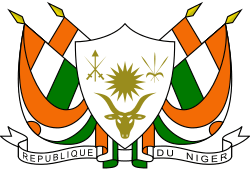Nigerien presidential election, 1993
 |
| This article is part of a series on the politics and government of Niger |
|
|
Politics portal |
Presidential elections were held in Niger on 28 February 1993, with a second round on 28 March after no candidate passed the 50% barrier in the first round. They were the first multi-candidate presidential elections held in the country since independence in 1960, following constitutional changes approved in a referendum the previous year. Although Mamadou Tandja of the ruling National Movement for the Development of Society (which had emerged as the largest party in the parliamentary elections) won the most votes in the first round, he lost in the second round to Mahamane Ousmane of the Democratic and Social Convention party.[1] Voter turnout was only 32.5% in the first round and 35.2% in the second.[2]
Results
| Candidate | Party | First round | Second round | ||
|---|---|---|---|---|---|
| Votes | % | Votes | % | ||
| Mahamane Ousmane | Democratic and Social Convention | 343,261 | 26.59 | 763,476 | 54.42 |
| Mamadou Tandja | National Movement for the Development of Society | 443,233 | 34.22 | 639,418 | 45.58 |
| Mahamadou Issoufou | Nigerien Party for Democracy and Socialism | 205,707 | 15.92 | ||
| Moumouni Adamou Djermakoye | Nigerien Alliance for Democracy and Progress | 196,949 | 15.24 | ||
| Illa Kané | Union of Democratic and Progressive Patriots | 32,951 | 2.55 | ||
| Oumarou Garba Issoufou | Nigerien Progressive Party – African Democratic Rally | 25,769 | 1.99 | ||
| Omar Katzelma Taya | Party for Socialism and Democracy in Niger | 23,565 | 1.82 | ||
| Djibo Bakary | Sawaba | 21,662 | 1.68 | ||
| Invalid/blank votes | 35,659 | - | 30,499 | - | |
| Total | 1,328,152 | 100 | 1,433,393 | 100 | |
| Source: Nohlen et al. | |||||
References
- ↑ Elections in Djibouti African Elections database
- ↑ Nohlen, D, Krennerich, M & Thibaut, B (1999) Elections in Africa: A data handbook, p690 ISBN 0-19-829645-2
| ||||||||||||||||||